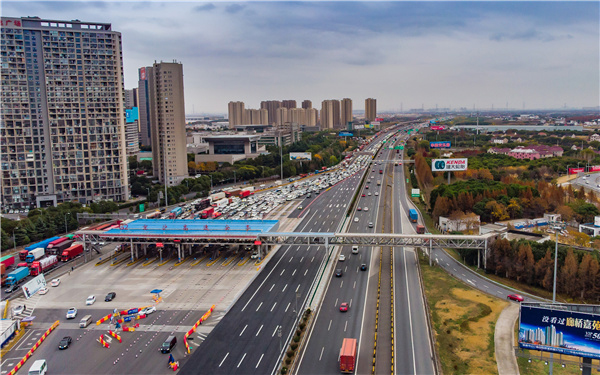
The Beijing-Shanghai Expressway is a major national expressway, linking Beijing in the north to Shanghai on the central coast. [Photo/Xinhua]
Zuo Peng, who lives in Langfang, Hebei province, drives to Beijing to work, spending about 30 minutes on the Beijing-Shanghai Expressway, commonly called the G2, every workday.
"The G2 has become an indispensable friend to me since I bought an apartment in Langfang in 2013, ending my renting life in Beijing," he said. "The expressway has helped me keep my job in Beijing while buying an apartment with my wife and children."
Like Zuo, many young people who cannot afford an apartment in Beijing have chosen Langfang, on the capital's outskirts, to settle down. The G2 has made it a reality for them to lead a two-city life.
China now has the world's largest expressway network, stretching 160,000 kilometers, long enough to circle the Earth four times. Those expressways have made people happier and wealthier and promoted regional economic growth along the roads.
The G2, 1,218 km long, links Beijing and the country's economic center, Shanghai, running through Tianjin municipality and Hebei, Shandong and Jiangsu provinces. It is a critical artery of the integrated economic development of the Beijing-Tianjin-Hebei region and the Yangtze River Delta region.
Construction began in December 1987, and the first section, linking Beijing and Tianjin, was opened in 1991.
At the very beginning there were just 153 km of expressways in six municipalities and provinces along the road. Now, it has formed an expressway network of more than 20,000 km in total in these areas. The overall economic output of those six municipalities and provinces, a mere 3 trillion yuan ($459 billion) in 2000, was 10 times that sum at the end of last year, according to government figures.
At 2 am in the Wuqing district of Tianjin, Zhu Fujie, a manager of an agricultural company, takes stock of produce as it is loaded into two trucks.
Those items, worth 90,000 yuan, will be transported to Beijing for sale. Using the G2, the trucks will arrive in Beijing about three hours later. Their freshness means better returns for farmers, a report by Economic Daily said.






